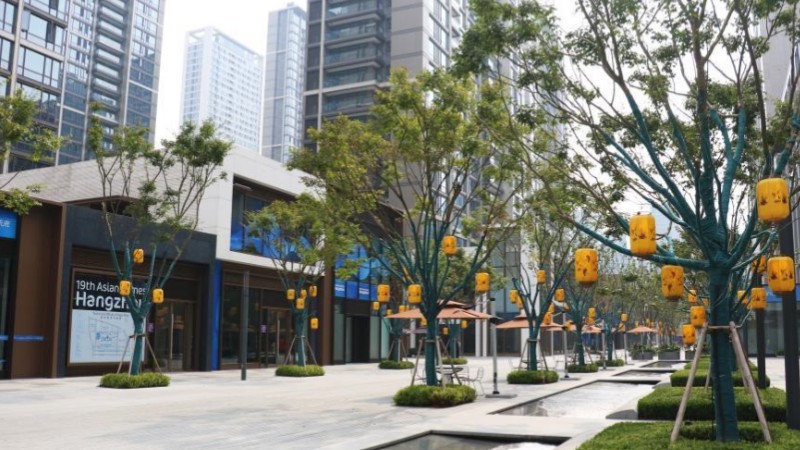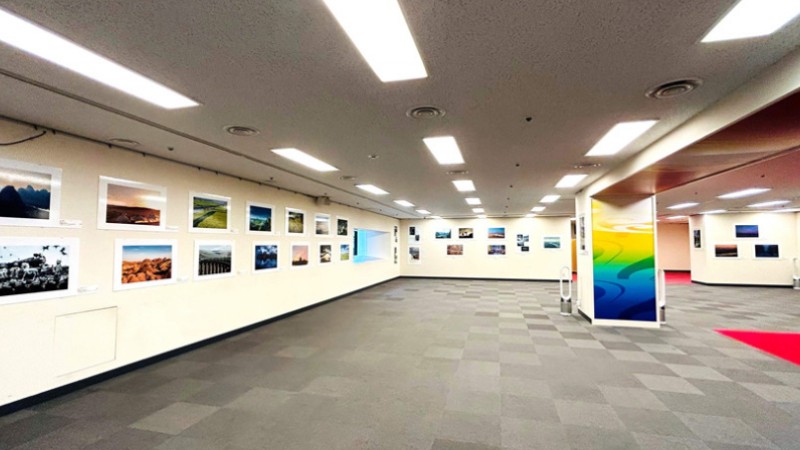From Xinjiang to Yiwu: The Belt and Road blueprint for success

A photo shows Yi Xiaojun (first from left) introducing Georgian red wine to customers, Aug. 16, 2023. (Photo by Shiliuyun-Xinjiang Daily/ Chen Qiangwei)
"Come here, please, and taste the tea I brewed," said Yi Xiaojun on Aug. 16, 2023, as he sat in front of his office tea counter, adeptly preparing Pu'er tea for reporters.
Dressed in a white shirt, the young man of the Xibe ethnic group, originally from northwest China's Xinjiang Uygur Autonomous Region, has now called Yiwu, in east China's Zhejiang Province, home for 19 years. Having married in Yiwu, he's embraced the local custom of welcoming guests with tea.
Discussing his journey from Xinjiang to Yiwu, Yi remarked, "My personal story is intertwined with the national policy of opening up to the world. The Belt and Road Initiative has fast-tracked the realization of my dreams."
Back in 2002, Yi was employed by a Georgian logistics firm at the Bianjiang Hotel Commercial Market in Urumqi. It was during this period that he taught himself Russian. His dedication and genuine nature cultivated friendships with many Georgian businesspeople, which helped him accumulate clients for his future entrepreneurship.
"In 2002 and 2003, our capacity expanded from two warehouses to eight, and at its peak, we could send 12 trucks of goods to Georgia per day," Yi recalled. At that time, all the goods sent to Georgia from across the country were gathered in the warehouse of the Bianjiang Hotel and then transported by road to Georgia.
Recognizing the significant volume of goods moving from Yiwu to Urumqi, the company decided in 2004 to send Yi to Yiwu to explore sea transport avenues.
And so, Yi became connected with Yiwu. Initially, he faced challenges adjusting to the local weather and cuisine. However, as trade between China and Georgia intensified, he immersed himself more in his work and gradually embraced life in Yiwu.
In the blink of an eye, 2010 arrived. At that time, Yi was preparing to marry a woman from Yiwu. Yet, he neither owned a car nor a house. Resolutely, he chose to start his own business.
"The entrepreneurial atmosphere in Yiwu is very good," Yi observed. Capitalizing on the strong reputation he'd established in his earlier roles, he garnered support from his Georgian clients during the nascent stages of his venture. By 2012, he had acquired his first office space.
"When doing business, you can't just focus on making money. You need to treat your customers as friends and put yourself in their shoes to achieve mutual benefit," said Yi. Having achieved success in his career, he's proudly fulfilled his marital vow to provide his wife with a good life.
As 2015 approached, Yi's foreign trade operations flourished consistently. However, mere stability didn't satisfy his ambitions; he yearned for fresh avenues to explore.
"At the time, it was two years since the Belt and Road Initiative had been proposed, and Georgia was one of the first countries to respond to it. I wanted to take the opportunity to find new business opportunities," Yi said.
That same year, Yi's acquaintances in Xinjiang introduced him to Georgian red wine, igniting his interest. "I've collaborated with Georgian partners for years, yet I was oblivious to Georgian red wine. It's plausible that many Chinese consumers share this unawareness," he noted, sensing a largely untapped market.
Delving deeper, he realized Georgia's rich viniculture legacy, with its conventional clay pot fermentation technique even hailed as a global intangible cultural heritage.
Interestingly, Yi Xiaojun, a non-drinker, specifically journeyed back to Xinjiang, where he noticed a burgeoning trend: the region, being the gateway to the Eurasian market, was witnessing a surge in demand for Georgian red wine. An entrepreneurial spark lit up: "This is a business opportunity."
Back in Yiwu, he immersed himself in understanding Georgian red wine intricacies and initiated the import process. "The thrill was reminiscent of embarking on a business endeavor for the very first time," Yi remarked.
In 2015, Yi founded a Georgian culture promotion and experience center in Yiwu and has been committed to promoting Georgian culture.
A year later, in 2016, the Yiwu Municipal People's Government signed a strategic cooperation agreement with the relevant Georgian authorities. After this pact, 360,000 bottles of red wine were promptly housed in the overseas warehouse of Yiwu's Bonded Logistics Center.
By 2018, the China-Georgia Free Trade Agreement was officially ratified, paving new avenues for Yi's ventures. Riding this momentum, he founded the Qvevri Georgian Red Wine Museum in Yiwu the ensuing year.
Nowadays, Yi not only helms his own red wine label but also collaborates with 15 distinguished Georgian wineries. His annual imports tally up to 540,000 bottles of Georgian red wine.
With the further development of the Belt and Road Initiative, Yi's foreign trade business has changed from a strictly export-centric approach to a balanced import-export model.
"The growing demand for high-quality goods from abroad has become a new way for me to showcase my skills," Yi said.
Having commenced with road logistics before transitioning to maritime channels, Yi is currently gearing up to leverage the speed and efficiency of the China-Europe Railway Express (Yixinou) to transport goods to Georgia.
"Over the past decade, I have traveled from Xinjiang to Yiwu, and my business has expanded from only exporting to importing and exporting. It's like I have walked my own 'New Silk Road,'" Yi laughed.
Source: english.ts.cn
Photos
Related Stories
- Xinjiang sees over 10,000 China-Europe freight trains so far this year
- Trailer: A one-of-a-kind summer experience in Bortala, NW China's Xinjiang
- Wondrous Xinjiang: Safeguarding power supply in "Sea of Death"
- Megaproject powers clean energy shift in southern Xinjiang
- Bumper harvest of aquatic products in NW China
- Pic story: transnational couple run cafe in Xinjiang's Kashgar
- In pics: ancient city of Kashgar in China's Xinjiang
- Tech-savvy farmer sows seeds of hope in cotton fields
- Folk song enthusiast keeps Daur heritage alive
- Charming performance on the Pamir Plateau
Copyright © 2023 People's Daily Online. All Rights Reserved.









